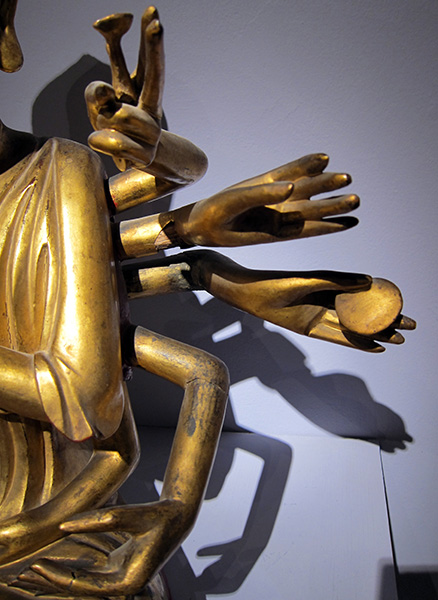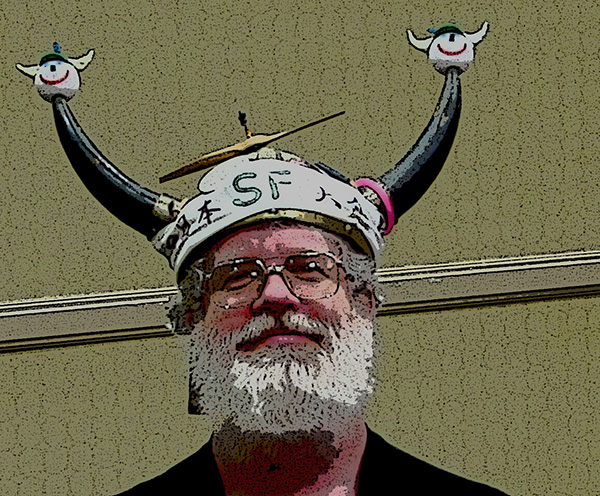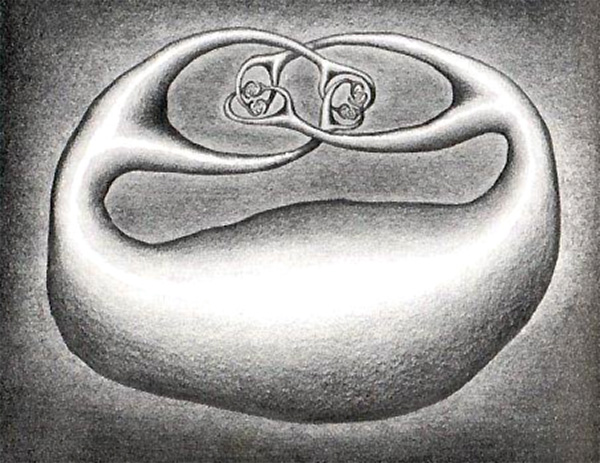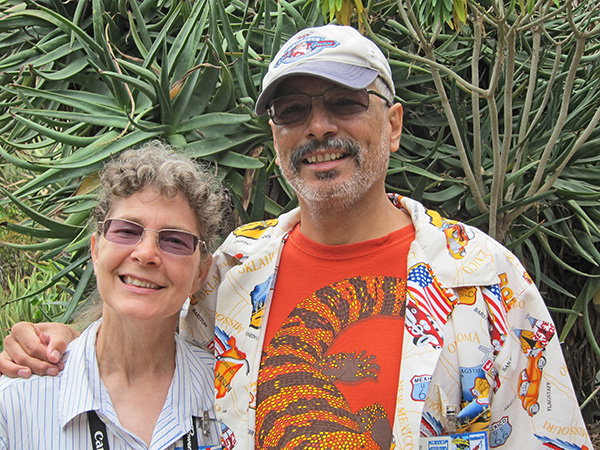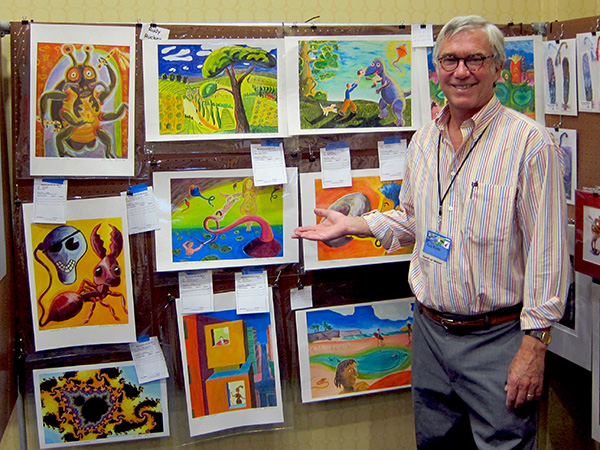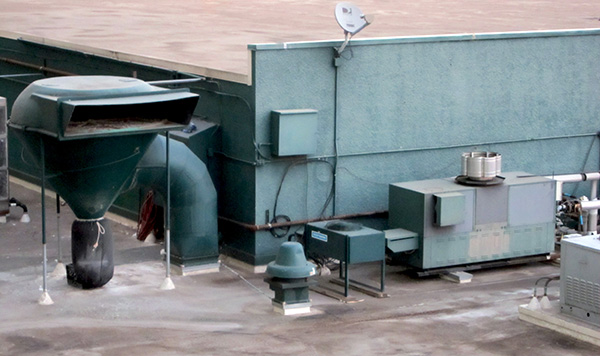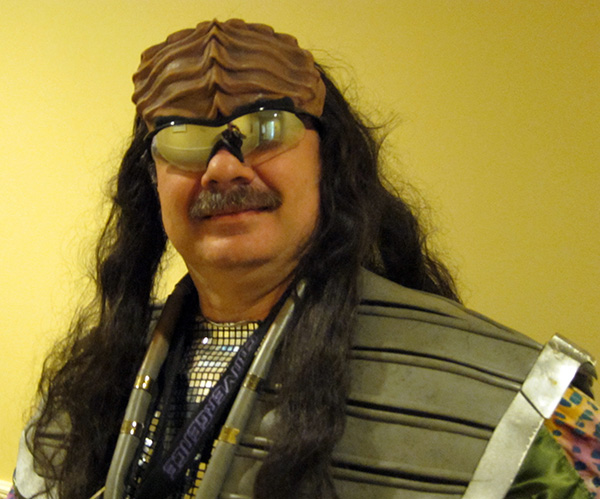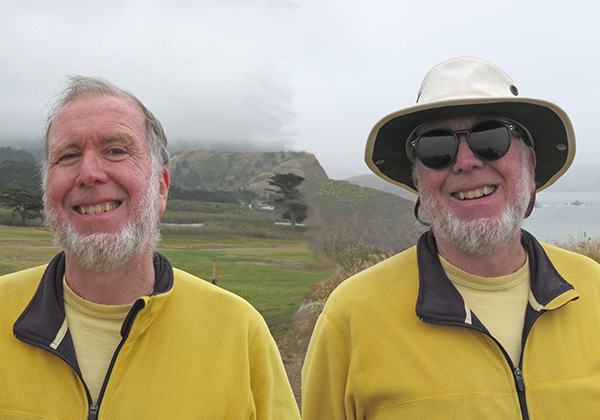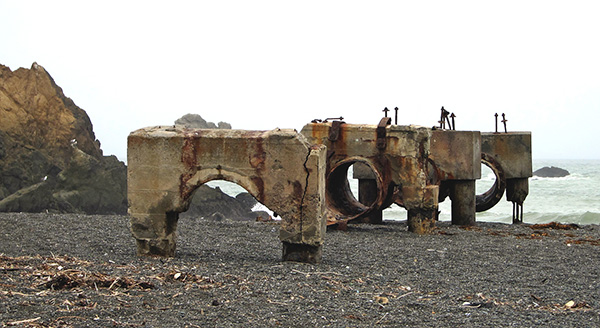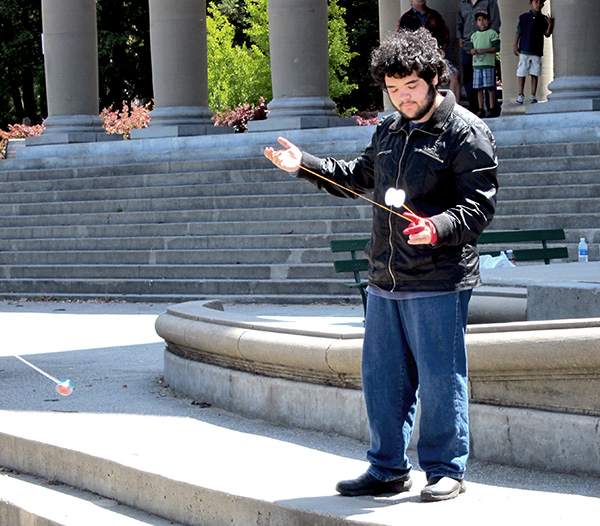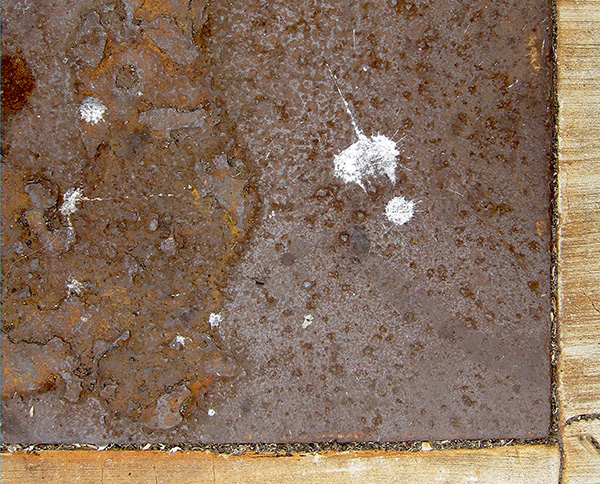On July 5, I podcast the spoken (and somewhat different) version of this talk; click on the icon below to access the podcast via Rudy Rucker Podcasts.
Here’s a draft of the talk on “New Futures in SF” that I’ll be giving at the Westercon in Pasadena, CA, at 11:30 AM on Sunday, July 4, 2010. I’m the Guest of Honor! Woo-hoo! I’ll be on a some panels and such on Friday, July 2, and on Saturday, July 3, as well.

Ideas and Stories
Living art forms change—think of painting or popular music or literary novels or even TV sit-coms. SF people are always sad to see the most recent “Golden Age” slip away, but it’s sadder still to keep doing the same thing. Inevitably the old material goes stale and the fire gutters down. It’s still possible to write novels about androids and spaceships and uploading your brain. And, by the same token, it’s still possible to write a doo-wop song or paint an abstract expressionist painting. But old forms become stiff and mannered, and working with them is a bit quixotic. Why not some new kinds of SF novel? This is, after all, the twenty-first century.

It’s sometimes hard to grasp that the physics and sociology of earlier SF are only things that past writers made up. The received ideas of SF are unlikely to apply to any actual future. There’s absolutely no reason why we can’t change the rules and dream up fresh futures of our own. We’re not duty-bound to copy what our predecessors did.
I’m going to talk about some fresh areas to mine for ideas. Note that having ideas is one thing, and turning them into stories is another. You need two separate things for a story: first of all, the SF idea or gimmick and, second of all, an underlying issue that the gimmick solves.
I’m of the transreal school of SF writing, so when I’m forming my ideas for an SF tale, I always look into my own life for the issues. That is, given an SF trope, I work to make the idea into a fresh and true metaphor for some immediate real-life concern of mine.

A cautionary note. By “real-life concern” I do not mean the doom-and-gloom that the official media are forever pushing on us. For years I’ve had a theory that commercial news, advertising, and mass entertainment are working in concert. All three of them promote fear and belligerence. Why? If you’re afraid, it’s easier for the politicians and the plutocrats to manipulate you. If you’re belligerent, you can be provoked into attacking whatever rebellious groups the politicians and plutocrats want to stamp out. And if you’re fearful and belligerent, you’re willing to hand over a large cut of your income to the warmongers who are “defending” you from their fellow warmongers in other lands.
So never mind the daily news. We never needed it anyway. Be here now. It’s time to run your own life, and to awaken from the fever dream we call history—if only for a few hours. It’s Independence Day!
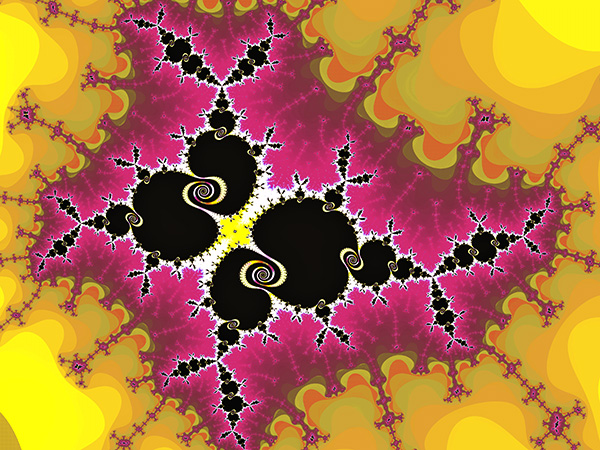
Come to think of it, I’d like to write a science fiction story about the notion that news stories are the hive-mind’s nightmares or, putting it more strongly, that news stories are an insane society’s hallucinations. But I’d need a nice SF gimmick to make a story out of it. As I said before, you need two things: the SF gimmick plus the transreal meaning. Here I’ve got the meaning but not the gimmick. But I can think of a gimmick pretty easily. Suppose that some individual is somehow taken over by the hive mind and he or she is the control-freak paranoiac behind news—but I’ll stop there and save the further details for my next story, I need something to write about this week.
Anyway, the point I was making is that I like for my stories to speak to a concern or an issue that troubles me personally—rather than to some pumped-up mind-control worries that the media are promulgating.
So what are the concerns that interest me? The things I notice in daily life. Looking around with an SF eye, I’m always wondering how it would be if some aspect of life were exaggerated just a bit more. Just today, I was thinking that, to save money, young couples might start having “reality weddings.” You can buy a ticket to attend their wedding and their reception, or for a smaller fee you can watch the festivities over a video feed. And if you’re in the patron’s circle, a fragment of your DNA is blended into the genes of the young couple’s first child so that you’re a kind of grandparent. And this line of thought speaks to me because these days I’m interested in being a grandparent.

There’s a number of more general concerns that have been with me for years. I’m doomed to die, and I wonder if that’s really the end. I have dreams every night, what do they mean? My thoughts aren’t really like a page of writing at all—they’re blotches and rhythms and associations—and is there any way to truly describe one’s real mental life? I want to go back to my youth, is there a way? What are the differences between being a child, an adult, and an old person? What is eating all about? Can I talk to my cells? What would it be like to be an ant or, even better, an ant colony? These are a few of the issues that happen to matter to me—but of course other writers will have very different issues of their own. Part of the trick is to make your own quirky concerns seem universal enough to interest others.
Let me make another general point before I get into some specific ideas for new futures. It is in fact very unusual to come up with a truly new idea. No matter how outré an SF or fantasy concept you dream up, more often that not you find out that someone used it in an obscure pulp-magazine story of the 1950s or, which hurts even more, on a TV show or even in a comic.
Beginning SF writers sometimes imagine that writing a story or novel is all about having the idea. I’ve had amateurs send me emails like, “I’m not a writer, but I have an idea for an SF novel. We’ll meet for coffee, I’ll tell you the idea, you’ll write the novel, and we’ll split the money fifty-fifty.”
As I said above, as well as the idea, you need the meaning—and more. You have to embody the idea into a social situation with characters that the reader will care about. The idea has to in some way solve a problem that has an emotional resonance to it. The characters have to grow and change. Generally you want to have a love interest in there. And you need what I call eyeball kicks, that is, some interesting things to visualize and think about. And so on. You need the idea, the meaning, the scene, the characters, and the plot as well. And, oh yeah, you need a literary style, so the sentences are evocative, clear, fun to read, and have a nice rhythm.

It is true that you need the idea, yes. But turning the idea into a story is really the bulk of the work. I don’t worry too much about people “stealing” any ideas that I mention on my blog or in talks like this. Even if you and I were to start with exactly the same idea, our stories would end up being very different.
I’m glad to be giving this talk, as just now I’m between novels and I don’t have an specific idea for my next one. One thing that makes the process a little harder for a seasoned writer is that, after a certain number of stories and novels, you’ve already written about most of the ideas that have obsessed you from early on.
In my case, this means that I’ve written about an infinitely large world, about a four-dimensional world, about flying jellyfish, about a giant ass from the fourth dimension (I was combining a few interests there), about robots who evolve, about robots made of soft plastic, about aliens who travel as cosmic ray particles, about UFOs that can travel into the future, about shrinking down to sizes below the tiniest elementary particles, about growing to sizes larger than the galaxy, about a biotech world in which there are no machines at all, about going to meet the intelligent vortex-beings who lurk within a glowing star, about the afterworld, about parasitic mind-controlling slugs who ride on people’s backs, about flying like Superman, about exploring the interior of the Hollow Earth, about a global swarm of virtual ants who destroy all TV, about a device that turns plain air into whatever object you want, about travelling to a parallel universe, and about a future in which every object in the world comes to life.
What’s left? Well, let’s see if I can come up with something today. And in the process, I may also be recycling some of those road-tested ideas I just listed. After all, it’s not a crime to use the same idea twice.

Live Brains
I suppose I need to mention the Singularity at least once—even though it’s become, in my opinion, a stale and media-driven tope. The basic idea is that computers will continue to gain in speed and memory capacity. And we hope somehow to develop really good software to take advantage of the improved hardware. The Singulatarian dream is that, before long, then software will start writing even better software on its own, and then—shazam—the machines will be smarter than people.
And if you buy vitamins from Ray Kurzweil’s web page, you may live long enough for the wise and kindly nanomachines of the coming-real-soon future to clean all the gunk out of your veins! And then you might live long enough so that your brain can be sliced and diced for your mind to be copied onto a computer so you’re immortal!
Mind copied into a computer so you’re immortal—hmmm, where I have I heard that idea before? Oh, right, that’s from my 1981 novel, Software. “Ya’ll ever ate any live brains?” asks one of my robot-employed mind-harvesters. I recall my cyberpunk pal John Shirley screaming this phrase out the window of a car at a con in Austin around 1982. “Ya’ll ever ate any live brains?”
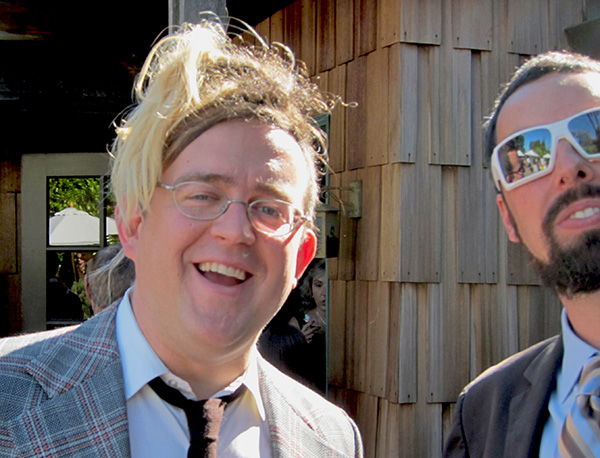
Actually, it’s more interesting to think about intelligence augmentation than about artificial intelligence. That is, what are some ways in which people might become noticeably smarter? I’m not so interested in brute-force approaches like shoving in more memory tissues or internalizing direct links to world wide web. The cool, SFictional thing would be if there were some in-retrospect-rather-obvious mental trick that we haven’t yet exploited.
Such tricks do exist. Think of how our effective intelligence improved with the advent of speech and of writing. In the mathematical realm, our ability to calculate got exponentially better when we started using positional notation. It would be cool if there some cute mental trick that would make us much brighter.
One of the dreams of AI is that there may yet be some trick like this that we can use to make our machines really smart. The only path towards AI at present is to more or less beat to death the problems of AI by using faster computers with every-larger data-bases. You set up a kind of neural network and train it and evolve it a little bit—not that anything like worldwide biological evolutions is practical in our little labs. But what if there was some clear and simple insight, some big aha?

When Everything Is Alive
Following the trail blazed by Charles Stross in Accelerando, I prefer to think out past the so-called Singularity. I wrote a pair of novels set in this zone: Postsingular and Hylozoic.
One of the ideas I was working with here is a fairly simple one: computer chips will go away. We don’t use little gears in our watches like they did fifty years ago, and I think it’s reasonable to expect that today’s chips will become outmoded, too.
What replaces them? I have two layers of speculations.
Biotech is likely to be the preeminent science of the 21st century, and we’ve really only scratched the surface with our SF. We’ve had some novels about plagues and about chimerical mixes of various species. But there’s so much more to explore. I like the idea of a person who becomes a disease that other people catch. And I like the idea of replacing every machine in existence by a biogadget—I wrote about this in Frek and the Elixir. But that was just a start.
My first speculation about future computers is that we’ll start using biotech to grow our computer hardware. A cuttlefish skin can display an amazing range of colors, updating the images at startling speeds. So why not a rectangle of tweaked cuttlefish skin for your display? And we can give our biogadget an embedded nervous system to take care of the computing chores. And how about input devices? Just wriggling your fingers should be enough if the biogadget pays attention. I don’t understand why we don’t already have this input technology.
Kicking it a notch further, it might be nice to have a wireless connection of some kind connected to your brain. I don’t think any reasonable person wants any kind of chip or biogadget implant. But I’ve often written about a soft slug-like device called an uvvy which sits on the back of your neck and picks up on the electromagnetic fields of your brain.
The uvvy is a symbol for the smart phone. In this vein, there’s a certain amount of SF material in the notion of people walking around staring at tiny handheld screens all day long. Peering at the world through their cellphones so as to see the augmented reality overlays. I’ve written about this before as “stunglasses,” but now that it’s really happening, there’s fresh observations to take into account.

My second idea about computers of the future has to with quantum computation. Atoms and molecules are always doing quantum computations, even when they’re just sitting around. These computations are in fact rich enough to emulate anything that an ordinary computer could do. If we can just get the hang of how to do it, we can start having computers that are chairs, rocks, air currents, glasses of water, candle flames—whatever.
Once we get this working, we’re ready for what I describe in my novel Hylozoic. Everything can be conscious and alive. Most of you won’t be familiar with the world “hylozoism.” It’s a real dictionary word that means, “the doctrine that physical objects are alive.”
I’d like to see a lot more SF about worlds where everything is alive. R. Crumb once drew a great comic where a guy’s cheeseburger starts talking to him. Why not? Lots of things talk these days, although thus far they don’t say anything interesting. But what if they did? It’s easy enough to layer on enough computer science to bring these fantasies into SF.
One cute idea that I touched on in Hylozoic is worth using again. If we view any bit of matter as carrying out a quantum computation, then what if something like a computer virus infects matter, perhaps changing the laws of physics to make our world more congenial to some other kinds of beings? Or what if you yourself dose your surroundings simply to make them more vibrant, more cartoony, more congenial. Instead of your getting high, your house gets high!
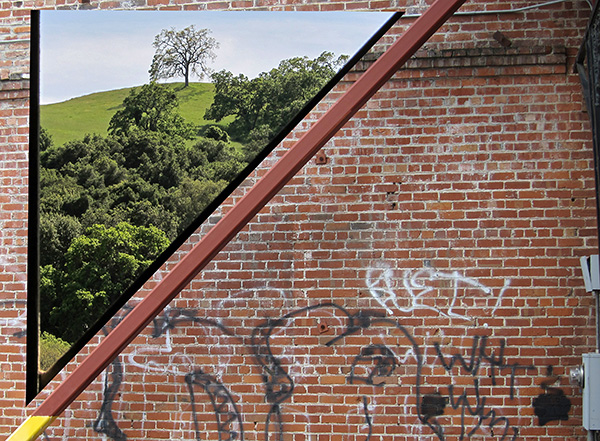
Magic Doors
As a boy, I learned about magic doors from the Narnia books and from Heinlein’s Tunnel In The Sky. I’ve always loved the idea of portals to other worlds. Looking at them through modern eyes, we can see the magic doors as being a bit like hyperlinks on the web.
If you model a magic door in physics, it often takes on the form of a so-called Einstein-Rosen bridge, which will look a little like one of a Christmas tree’s mirror balls—a little sphere that seems to have another world inside it. And if you push towards an E-R sphere, you get smaller, and you fit inside it, and then you’re in the alternate world.
I like to think of a character with spherical portals like this swarming around him or her like multicolored fireflies. Wheeling about like a cloud of memories. Some of them may lead to alternate worlds, but some might lead into the past…or even into the afterworld.
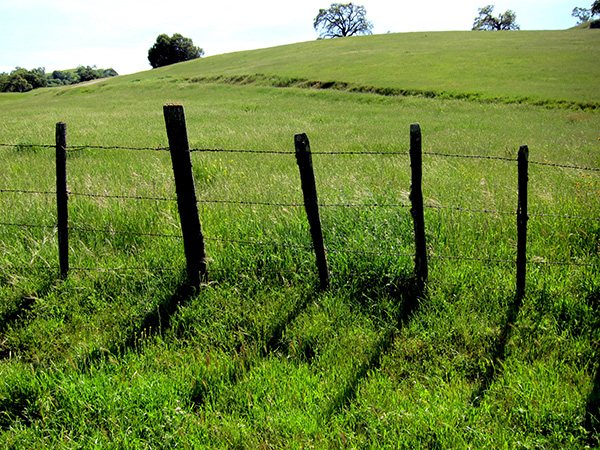
Alternate Worlds
Contemporary physicists speak of worlds parallel to ours as “branes.” In some theories there’s only two branes or perhaps a few more, maybe seven.
I like the idea of a limited number of parallel worlds, as I’ve always found the notion that all possible universes exist to be kind of inane and defeatist. If every possible world exists, then there’s no particular reason for anything. But if you actually pay attention to the world we’re in, you’ll notice that it’s very highly structured. It’s hard to be sure, but reality seems shot through with interesting coincidences—what C. G. Jung called synchronicities. To me, it feels as if our universe is as least as well crafted as an extremely good novel.
Who wrote the novel we live in? In Mathematicians in Love, I took up this question, and had the divine author be a large jellyfish living in a lagoon in a parallel brane. The jellyfish turns in a fresh draft of our universe every Friday, and each draft is better than the one before.
An idea I haven’t explored very much is that our universe might in some way self-organize itself—like a pattern of ice-crystals forming upon our spacetime brane as metatime elapses.
A particularly virulent version of the all-possible-universes mind-virus is the notion that our time is continually branching. The physicist Hugh Everett showed that this notion is consistent in his famous papers on “The Many Worlds Interpretation of Quantum Mechanics.”
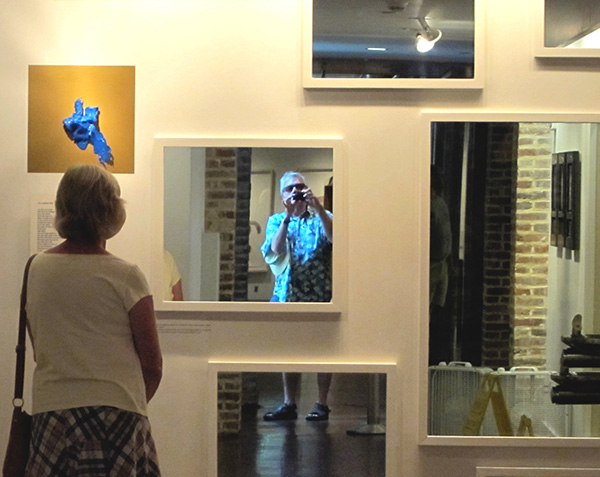
Last year I read Neal Stephenson’s Anathem, in which time has a branching quality, and the characters have an ability to sniff out the best universe for them to be moving forward into. It’s a good read, but there’s to be something fundamentally incoherent about the SFictional notion of picking an optimal world from many equally real possible worlds.
My sense is that if time really branches, then you wholeheartedly go into each branch; you’re conscious in each of them, and there’s no single “lit-up by the searchlight of the mind” branch that zigzags up through the time-tree to limn the path that you “really” take. The whole tree is lit. You really and truly think you’re in each branch that has a version of you.
Turning, however, from logic to emotion, I do have an appreciation and a longing for the heroic concept that I really am selecting a best possible path. I mean, that’s how a human life is lived. You consider the outcomes of possible actions, and you direct your actions so as to realize the more favorable results.
We have an emotional, experiential sense that the bad, unchosen paths are in fact shriveling away to the left and the right. There’s a sense of this in Phil Dick’s vintage precog story, “The Golden Man.” I’d like to see a story in which the unchosen paths really are withering away. Suppose, for instance, suppose that my branch is not quite a pure jagged line. It does very commonly grow a stub out a few seconds past a given branch point, then back up and go into the proper branch. There’s a continuous line of time but it sometimes loops back a bit and then starts forward on a new tack.
The backups are very common, in fact they’re all but ubiquitous. Most people don’t notice this, because when time backs up, events run backwards and memories get erased. But our hero or heroine does learn to notice.

The Subdimensions
For too long we’ve let the quantum mechanics tell us that nothing smaller than the Planck length. Let’s view this tiny size scale as a membrane, a frontier, but not a wall. Some string theorists speculate that the subdimensional world below the Planck length is a kind of mirror version of ours. Other physicists have recently suggested that, at the microscale, space has a higher-dimensional thickness.
Suppose we can delve into space and get down below the Planck length to enter the land of—the subdimensions. I think pulp writers used that word in the 1940s. Recently I’ve taken to using it a lot myself.
One of the tricks of SF writing is to keep switching to newer buzzwords for your magical mysteries. In the 1940s they were content with talking about radio and radiation. And then it was curved space and black holes. Then came cybernetics and quantum mechanics. And then quarks and string theory. These days I’m liking bosons and the subdimensions.
Aliens can visit us from the subdimensions, so there’s no need for those tiresome star ships. Just focus on a speck of dust and get into it.
Recently a news-media-controlled man asked me if I was planning to write an SF story about the recent Louisiana oil spill. I wouldn’t exactly want to write about that. But it would be nice to do a happy story in which we discover an incredible new energy source.
This has, of course, been done before. But I like the idea of getting our energy from—the subdimensions. And, as a transreal kicker, because we pump out too much energy, space starts to, like, shrivel and collapse. We turn as wrinkled as leaky balloons.

Infinity and Beyond
I’ve always like to think about a world that’s an endless flat plane, a place where you can walk (or fly your electric glider) forever in a straight line and never come back to where you started. This is, after all, the underlying dream of a long road trip. Just keep going and you’ll encounter—the cockroach men! The empire of the two-headed women!
Larry Niven’s Ringworld has some of this quality of being an incredibly large place where you can drive around. And I’ve been told that Charles Stross’s “Missile Gap,” explores a very large world as well.
But infinite would be better. What if our world were suddenly to become infinite over night. There’s a rumble like from an earthquake and, wow, our little planet will have unrolled, ready for you to start out on the ultimate On the Road adventure and, oh my God, Jack Kerouac and Neal Cassady are parked right outside your house!
I got a Ph. D. in mathematics, and my thesis topic was set theory, the science of transfinite numbers. I studied infinities bigger than infinities—big boys like alef-one and alef-seven.
Historically, physicists eventually find a physical application for just about every sufficiently batshit idea that pure mathematicians dream up. To pave the way, we need SF about transfinite numbers in the large (as in space being larger than infinity) and in the small (as in matter being more than infinitely divisible).
I wrote a story along these lines called “Jack and the Aktuals, or, Physical Applications of Transfinite Set Theory.” You can find it online at Tor.com. But there’s plenty of room for more.
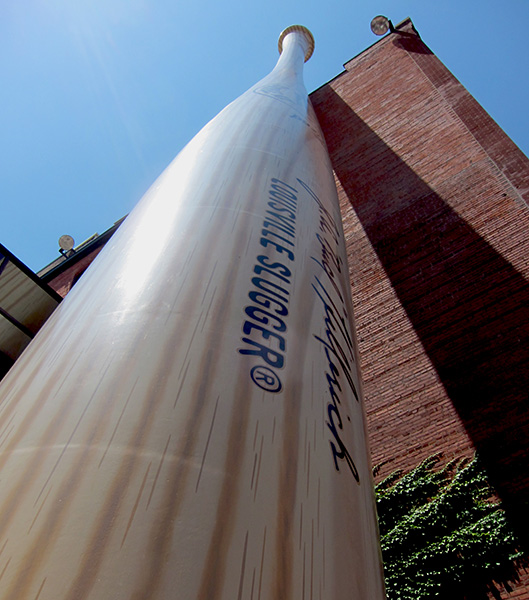
Dreams and Memories
I think there’s still a lot of interesting things to be done with dreams. Waking up inside them? Finding out that they’re really happening in a higher dimension?
I quite recently wrote a story with Bruce Sterling which is about some SF-writer types whose job is crafting dreams to sell to other people. And this isn’t a new theme.
In the mental front, we might also consider viewing memories as in some sense real. Maybe memory is a form of time-travel, and you really can flip back into the past or, more oddly, bring people from your past into your present.
I’ve never gotten it together to writ a full time-travel novel, I haven’t been able to see a way to make it new. And getting around the paradoxes in a fresh way is tricky. Maybe a guy develops 4D consciousness so that he’s present at each instant of his life. And then his long world-snake of a time body starts to writhe…

Higher Realities
I’ve always thought there should be more SF that speculates about what happens to people after they die. This can shade into fantasy, of course, but giving it an SF slant would be interesting. Certainly it’s nice to speculate that there’s some kind of afterworld…rather than nothing.
I’ve written two novels about the afterworld, my early White Light (which is also about a transfinite world) and my recent Jim and the Flims, which hasn’t yet appeared. My personal motivation for returning to the afterworld theme is that, as I get older, death is becoming increasingly real to me. It’s easy to believe that death is a lights-out situation. But it’s comforting to write an SF novel in which things work out differently.
If we develop a SFictional notion of an afterworld, then we’re also free to write about ghosts. Perhaps people might develop some new augmented senses. What if you could “see” radio-waves, electrical charges, neutrinos, Higgs bosons, or neutrinos? Maybe these senses would let you see specters.
Not that the specters necessarily have to be the ghosts of dead people. I’ve often imagined that our world is in fact replete with alien beings whom, for whatever reason, we’re ordinarily unable to perceive. Those flashes of light you see out of the corner of your eye sometimes—maybe those are alien beings.
Thinking along these lines leads to notions of higher realities. It would be nice to see some stories about levels at which archetypes are real. It would be nice to visit God’s art studio.

Why?
Why are we here? What’s it all for? What’s the meaning of life? Why does anything exist at all? Why is there something instead of nothing? I await your answers.













